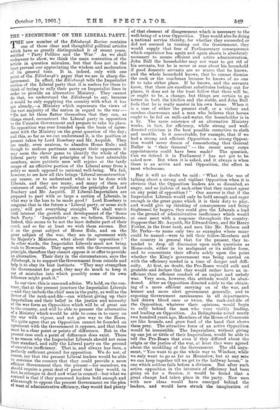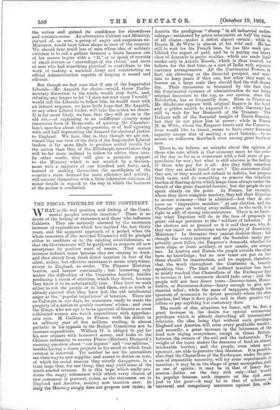THE " EDINBURGH " ON THE LIBERAL PARTY.
rview nuniber of the Edinburgh Review contains one of those clear and thoughtful political articles which have so greatly distinguished it , of recent years, entitled "Party Polities and the War." As we shall endeavour to show, we think the main contention of the article in question mistaken, but that does not in the least prevent our appreciating the wisdom and moderation i of its general tone. It s, indeed, only with one point of the Edinburgh's paper that we are in sharp dis- agreement. In effect, the Edinburgh tells the Imperialist section of the Liberal party that it is useless for them to think of trying to rally their party on Imperialist lines in order to provide an alternative Ministry. They cannot do that, we understand the Edinburgh to say, because it would be only supplying the country with what it has got already,—a Ministry which represents the views of the vast majority of the nation in regard. to the war :— " Do not 'let them flatter themselves that they can, as things stand, reconstruct the Liberal party in opposition to the Unionist Government and prepare to take its place. No opposition was ever founded upon the basis of agree- ment with the Ministry on the great question of the dap; and this, so far as we can understand it, is the position at present taken by Lord Rosebery and Mr. Asquith. They are ready, even anxious, to abandon Home Rule ; and though to zealous partisans amongst their opponents it may seem the clever game to identify the whole of the Liberal party with the principles of its least admirable members, more patriotic men will rejoice at the tardy escape of an effective portion of the Liberal army from a policy so much opposed to national well-being. We fail, however, to see how all this brings 'Liberal reconstruction' any nearer, or to understand what is to be done with Liberals, and they are many, and many of them are statesmen of mark, who repudiate the principles of Lord. Rosebery and Mr. 'Asquith. If Liberal-Imperialists are prepared to part with so large a section of Liberals, in what way is the loss to be made good ? Lord Rosebery is sanguine that in the future a Liberal party, or some such party,' will put everything straight. We shall watch with interest the growth and development of the Some Such Party.' 'Imperialists' ' are, we believe, Unionists. Indeed, this seems to be not the least definite part of their creed, and so far at least we wish them success. But if on the great subject of Home Rule, and on the great subject of the war, they are in agreement with his Majesty's Ministers, what 'about their opposition ? " In other words, the Imperialist Liberals must not bring coals to Newcastle. They agree with the Government in principle, therefore they cannot oppose it or offer to provide an alternative. Their duty in the circumstances, says the Edinburgh, is to support the Government from outside and help it to obey its best instincts. "They may strengthen the Government for good, they may do much to keep it out of mistakes into which possibly some of its own followers might push it."
In our view, this is unsound advice. We hold, on the con- trary, that at the present juncture the Imperialist Liberals —and, they include the chief men in the party, as well as the flower of the rank-and-file--can without giving up their Imperialism and their belief in the justice and necessity of the war form an Opposition which will be of great use to the country, and will be able to present the alternative of a Ministry which would be able to come in to carry on the war with vigour, and not give way to the Boers. e quite agree that an Opposition cannot be founded on agreement with the Government it opposes, and that there must be a clear point or points of difference. But in the Present case such a point of difference does exist. There is no reason why the ImPerialist Liberals should. not raise their standard, and rally the Liberal party on the ground of executive inefficiency. That is, and always has been, a Perfectly sufficient ground for opposition. We do not, of course, say that the present Liberal leaders would be able to convince the country that they could provide a more efficient Government than the present—for ourselves, we should require a great deal of proof that they would; in fact, be stronger in deed and wiser in council—but what we contend is that if they possessed leaders bold enough and able enough to oppose the present Government on the plea of want of administrative efficiency, they would find plenty of that element of disagreement which is necessary to the well-being of a true Opposition. They would also be doing a national service thereby, for whether they succeeded or did not succeed in turning out the Government, they would supply that fear of Parliamentary consequences which experience has again and again shown is absolutely necessary to secure efficient and active administration. John Bull the householder may not want to get rid of his servants, but he is never at ease about his household if good domestic servants are so scarce that he knows, and the whole household knows, that he cannot dismiss the cook or the coachman because he knows of no one fit to take either place. If he knows, and the servants know, that there are excellent substitutes looking out for places, it does not in the least follow that there will be, or ought to be, a change, but things are certain to go better in both the kitchen and the stable, and John Bull feels that he is really master in his own house. When it is a case of either the present staff, or a violent and careless charwoman and a man who believes that horses ought to be fed on milk-and-water, the householder is in a fix. The mere existence of an alternative Ministry works, in fact, for efficiency, while strong and well- directed criticism is lie best possible corrective to sloth and muddle. Is it conceivable, for example, that if we had a strong and efficient Opposition—a strong Opposi- tion would never dream of remembering that General Buller is "their General" — the recent army corps appointments could have been made? The question,. Can we defend it in Parliament ? has not got to be asked now. But when it is asked, and it always is when there is an active and real Opposition, the effect is most wholesome.
But it will no doubt be said : "What is the use of talking about a strong and vigilant Opposition when it is. obvious that the Opposition -leaders are so disunited, so angry, and so jealous of each other that they cannot agred on any point of opposition ? " Our answer is that if the Imperialist Liberals would only be bold, enough and eager enough in the great game which it is their duty to play, and would give up thinking of consequences and being frightened by bogeys, t'hey could. give the Liberals •a lead on the ground of administrative inefficiency which would at once meet with a response throughout the country. Suppose that Mr. Asquith, Sir Edward Grey, and Sir Henry Fowler, in the front rank, and men like Mr. Robson and Mr. Perks—to name only two as examples where many could be named—were to tell their fellow-Members and the country in general that for the present, they in- tended to drop all discussion upon such questions as Home-rule, either in its malignant or its milder form, and to concentrate their efforts solely upon the point whether the King's government was being carried on with the efficiency needed in a time of danger and diffi- culty. At first, no doubt, the Pro-Boers would sulk and grumble and declare that they would rather have an in- efficient than efficient conduct of an unjust and unholy war. Very soon, however, this attitude would be aban- doned. After an Opposition directed solely to the obtain- ing of a more efficient carrying on of the war, and keener and more alert government generally, and. to exposing Government carelessness in all departments had drawn blood. once or twice, the rank-and-file of the Opposition, whatever their opinions, would begin to rally behind the men who were visibly leading, and leading an Opposition. As Bolingbroke noted nearly two hundred years ago, Members of the House of Commons are like hounds, and grow fond of the hand that shows them prey. The attractive force of an active Oppositioi would be irresistible. The Imperialists, without giving up one jot or tittle of their Imperialism, would be able to tell the Pro-Boers that even if they differed about the origin or the justice of the war, at least they were agreed about the muddling of the Government. The old argu- ment, "You want to go the whole way to Windsor, while we only want to go as far as Hounslow, but at any rate we can keep together till we get to the halfway house," is one which seldom fails before a division. But after such active opposition in the interests of efficiency had been going on for a Session, it would be found that a great change had taken place in the party. New men with new ideas would have emerged behind the leaders, and would. have struck the imagination of the nation and gained its confidence for shrewdness and common-sense. An alternative Cabinet and Ministry, instead of, as now, a group of angry and suspicious ex- Ministers, would have taken shape in view of the country. We should hear much less of men whose idea of military criticism is to call a gallant General a brute because one of his names begins with a "B," or to speak of recruits of small stature as "starvelings of the slums," and more of men who had something practical to contribute to the work of making a national Army and constructing an official Administration capable of keeping it sound and efficient.
But though we feel sure that if any of the Imperialist Liberals—Mr. Asquith for choice—would throw Parlia- mentary discretion to the winds, would step forth, and, refusing any longer to let "I dare not wait upon I would," would call the Liberals to follow him, he would meet with an instant response, we have little hope that Mr. Asquith, Or any other Liberal leader, will take the action we desire. It is far more likely, we fear, that they will go on in the old rut,—of explaining to an indifferent country some innocuous form of Home-rule, of quoting Mr. Chamber- lain's speeches about old-age pensions, or of half agreeing with and half deprecating the demand for electoral justice to England. We fear, that is, that though we are con- vinced that our view of the duty of the Imperialist Liberal leaders is far more likely to produce useful results for the nation than that of the Edinburgh, nevertheless they will be far more inclined to follow its advice than ours. In other words, they will give a patriotic support to the Ministry which is not wanted by a Govern- ment with a majority of one hundred and forty, and, instead of making themselves the mouthpiece of the country's stern demand for more efficiency and. activity, will content themselves with a little lukewarm criticism of minor details in regard to the way in which the business of the nation is conducted.















































 Previous page
Previous page